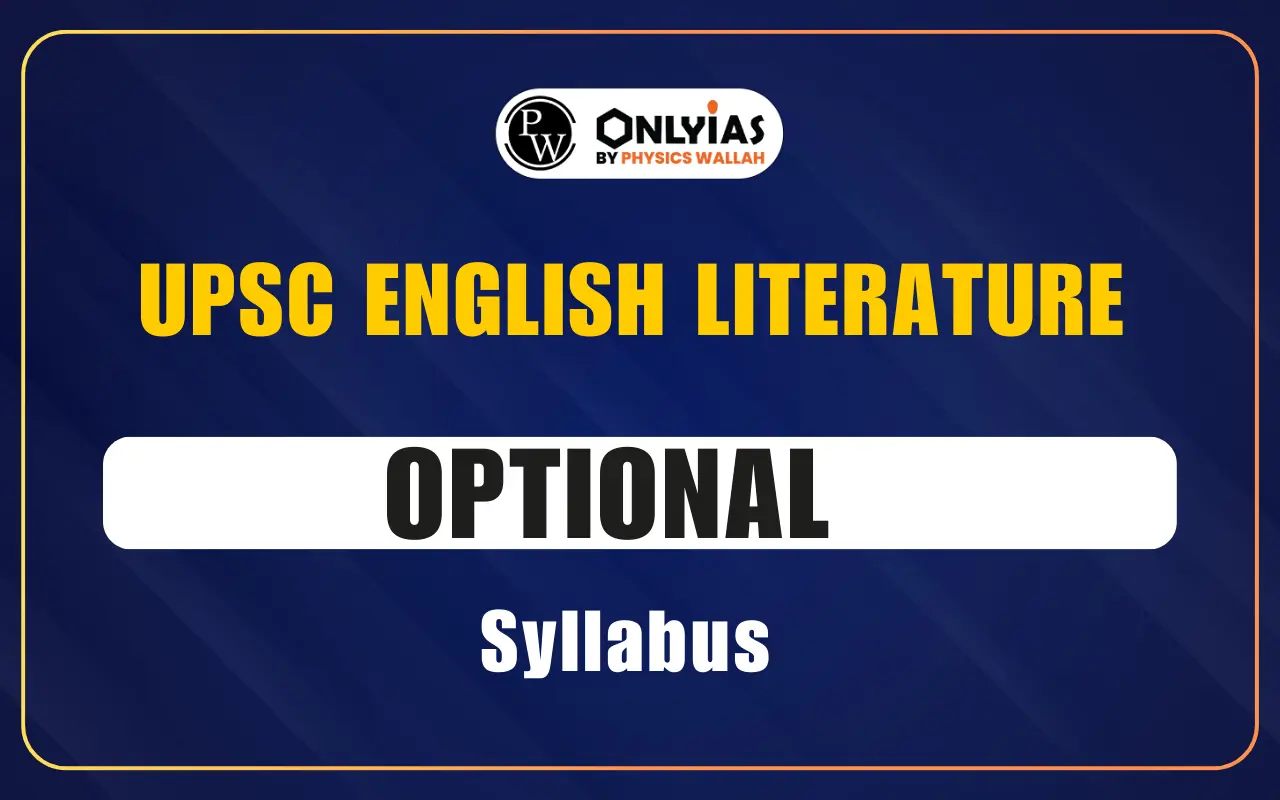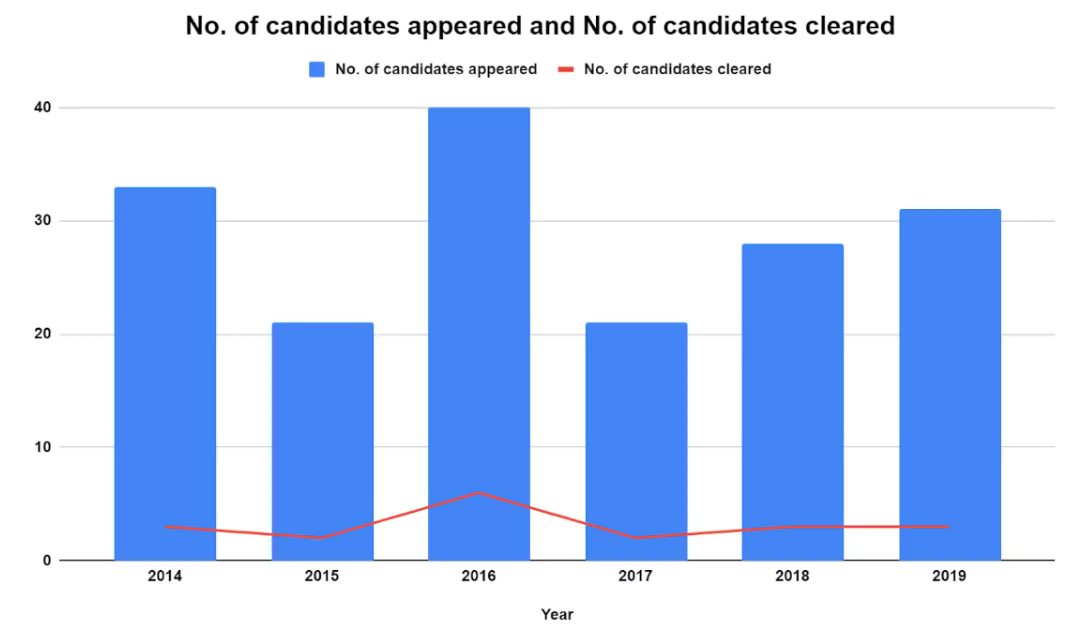Get comprehensive insights into the UPSC English Literature Optional Syllabus for Mains, along with an in-depth analysis of the exam pattern, recommended books, success rate, toppers' strategies, and download previous year question papers.

English literature Optional is one of the optional subjects under the “literature language optional category” mentioned in UPSC notification. It is one of the 23 Literature optional subjects mentioned in the UPSC list. If candidates have a genuine interest in English literature and are familiar with the language and its cultural context, choosing this subject will make studying and preparing for the exam more enjoyable and motivating.
This article will look closely at English literature from all possible dimensions to help students do well and get high marks in this subject.
English Literature covers the extensive written works produced in the English language, spanning centuries and continents. From timeless classics by Shakespeare and Dickens to contemporary masterpieces by authors worldwide, it offers insights into human experiences, cultures, and perspectives. Studying English Literature provides a window into the complexities of language, storytelling, and the evolution of ideas throughout history.
English literature has a strong tradition of satire and social commentary, with authors like Jonathan Swift, using their works to critique society and provoke thought on political and moral issues. The English language continues to evolve, and contemporary authors such as Margaret Atwood, Kazuo Ishiguro, Naomi Alderman, and Octavia E. Butler contribute to the ever-expanding landscape of English literature with their innovative storytelling and exploration of contemporary themes.
The UPSC English Literature optional subject allows candidates to explore the world of English literature, exploring various genres like poetry, drama, fiction, and literary criticism. It covers works from different periods and regions, including British, American, and Indian literature. Candidates are expected to analyze and interpret texts, understand literary movements, and appreciate the cultural and historical contexts of literary works. This optional subject offers candidates a chance to showcase their understanding and appreciation of literature, which can enhance their overall performance in the exam. Developing a regular writing practice sharpens analytical and expressive skills.
Like all other optional subjects in UPSC optional subject list, the subject is made up of two papers, Paper 1 and Paper 2, each carrying 250 marks. Each paper is divided into two sections. Each paper has a total of eight questions, divided equally into four questions.
A candidate has to attempt any five questions. Question 1 and 5 are compulsory. Out of the remaining six, any three have to be attempted, with at least one from each section. Answers must be written in the English language only.
UPSC English Literature Optional Exam Pattern |
|
| Particular | Details |
| Total Papers | Two papers, Paper I and Paper II |
| Total Marks | 500 (250 Each) |
| Time allowed | 3 Hours for each paper |
| Sections | Section A and Section B |
| Questions | total 8 questions with subparts |
| Compulsory Question | Question Nos. 1 and 5 |
| Marks Distribution | 10, 15, and 20 marker questions |
The UPSC English Literature optional syllabus covers a wide range of topics, including British, American, and Indian literature from different time periods. It includes the study of major literary movements, such as Romanticism, Modernism, and Post-Colonialism, along with prominent authors and their works. The syllabus also includes literary criticism, literary theory, and the historical and cultural contexts of literature. It offers candidates a comprehensive understanding of literature and its significance, allowing them to showcase their analytical and interpretative skills in the civil services exam.
The syllabus consists of two papers, designed to test a first-hand and critical reading of texts prescribed from the following periods in English Literature : Paper I : 1600-1900 and Paper II : 1900–1990. There will be two compulsory questions in each paper : (a) A short-notes question related to the topics for general study, and (b) A critical analysis of UNSEEN passages both in prose and verse. The syllabus of English Literature is divided into two segments i.e Paper I and Paper II.
The UPSC English Literature Optional Syllabus Paper 1 covers a diverse range of literary works and critical concepts. Candidates will explore many genres like poetry, drama, and prose fiction, dissecting themes, characters, and narrative techniques. Along with given syllabus, Candidates will also be required to show adequate knowledge of the following topics and movements : The Renaissance; Elizabethan and Jacobean Drama; Metaphysical Poetry; The Epic and the Mock-epic; Neoclassicism; Satire; The Romantic Movement; The Rise of the Novel; The Victorian Age. Find the detailed English Literature Syllabus for UPSC Paper I below. Answers must be written in English.
| Section A | |
|
|
| Section B | |
|
The UPSC English Literature Optional Syllabus Paper II covers study of literature, focusing on specific themes, periods, and genres. It includes topics such as modern and contemporary literature, post-colonial literature, and Indian writing in English.
Along with given syllabus, Candidates will also be required to show adequate knowledge of the following topics and movements : Modernism; Poets of the Thirties; The stream-of-consciousness Novel; Absurd Drama; Colonialism and PostColonialism; Indian Writing in English; Marxist, Psychoanalytical and Feminist approaches to literature; Postmodernism. Find the detailed syllabus below.
|
Section A |
|
|
Section B |
|
The UPSC English Literature Optional Syllabus for CSE 2026 consists of two papers, each worth 250 marks, focusing on critical reading of texts from 1600-1900 in Paper I and 1900-1990 in Paper II. Paper I covers Shakespeare, Renaissance literature, 18th-century poetry, Romantic and Victorian eras, including works like King Lear, Tempest, and poems by Wordsworth and Browning. Paper II emphasizes modernism, stream-of-consciousness novels, absurd drama, post-colonialism, Indian writing in English, and literary theories such as Marxist, feminist, and psychoanalytical approaches. Candidates must address compulsory short notes and unseen passage analyses in both papers. Download the detailed syllabus PDF here:
It is advisable for candidates to choose books wisely from a wide range of options to score good marks in UPSC English literature optional exam in IAS exam. The right books will help them cover all the topics easily and gain a better and more in-depth understanding of the exam sections. To ensure the best preparation, candidates can refer to the English literature books and other subject-specific books mentioned below to excel in the exam.
Optional subjects in UPSC are numerous, and each subject has its own domain. That is why each subject has its own advantages and disadvantages depending on the interest and background of candidates. Still, we try to find out some advantages and disadvantages of English Optional subjects.
Advantages |
Disadvantages |
|
|
Below are the Download links:
| Year | Paper Download Link |
| 2025 | Paper 1 |
| 2024 | Paper 1 |
| 2023 | Paper 1 |
| 2022 | Paper 1 |
| 2021 | Paper 1 |
| 2020 | Paper 1 |
| 2019 | Paper 1 |
| Year | No. of candidates appeared | No. of candidates cleared | Success Rate (%) |
| 2014 | 33 | 3 | 9.1 |
| 2015 | 21 | 2 | 9.5 |
| 2016 | 40 | 6 | 15 |
| 2017 | 21 | 2 | 9.5 |
| 2018 | 28 | 3 | 10.71 |
| 2019 | 31 | 3 | 9.7 |

| Year | Name | Rank |
| 2022 | Arya VM | 36 |
| 2017 | Anjali S | 26 |
| 2015 | Gaurav Garg | 320 |
Getting a good score in the UPSC exam for English literature needs careful planning and doing things step by step. It’s important to get help from different places to do well in the exam. If you’re getting ready for the English literature part of the exam, you can do better by following these steps:
Here’s a roadmap to help you conquer the UPSC English Literature Optional Syllabus:
Answer Sheets of the toppers who have given mock tests for English Literature Optional can help candidates get familiar with the writing style and flow of the answer that UPSC demands and can excel in this exam. The topper marksheet can be easily available to various blogs and telegram groups, where candidates can avail themselves of it and analyse it.
Preparing for any optional subject is not enough without planning. If candidates are willing to choose English Literature as their optional subject, then they need to have a plan for both general studies and English Literature separately. This is because for literature, candidates need to practice writing in the language script. Also, candidates can look at previous successful candidates’ notes and watch their strategy videos to make their own plan for handling the challenges.
| Must Read | |
| NCERT Notes For UPSC | UPSC Daily Current Affairs |
| UPSC Blogs | UPSC Daily Editorials |
| Daily Current Affairs Quiz | Daily Main Answer Writing |
| UPSC Mains Previous Year Papers | UPSC Test Series |
Check Out UPSC CSE Books
Visit PW Store
English can be a good optional subject for the UPSC exam for candidates who have a strong command of the language or have studied it extensively. It offers an opportunity to express their knowledge and expertise in English literature and language.
The UPSC essay paper needs to be written in either English or any of the scheduled languages mentioned in the Eighth Schedule of the Constitution of India. English is one of the scheduled languages, so it is allowed for the essay paper.
No, English Paper 1 and English Compulsory Papers are not the same in the UPSC exam. English Paper 1 typically refers to the optional subject paper where candidates can choose English literature as their optional subject. On the other hand, English Compulsory Papers usually refer to the language papers that are compulsory for all candidates, which include the English language paper along with papers for English and other Indian languages.
It depends, Candidates with non English background can find it very challenging to opt this subject.
It's advisable to choose a literature optional subject for UPSC if you've extensively studied it during your college years. This is because the preparation involves reading a significant amount of material. Additionally, finding coaching resources for these optional subjects might be limited, so prior familiarity with the subject can be beneficial.
<div class="new-fform">
</div>